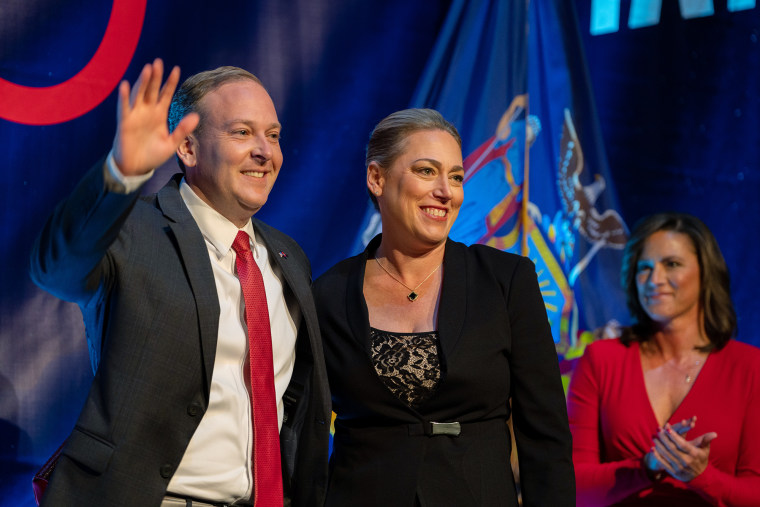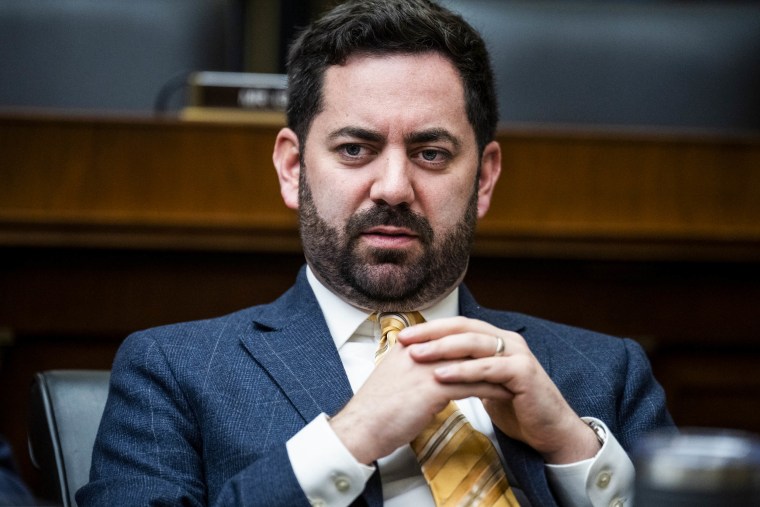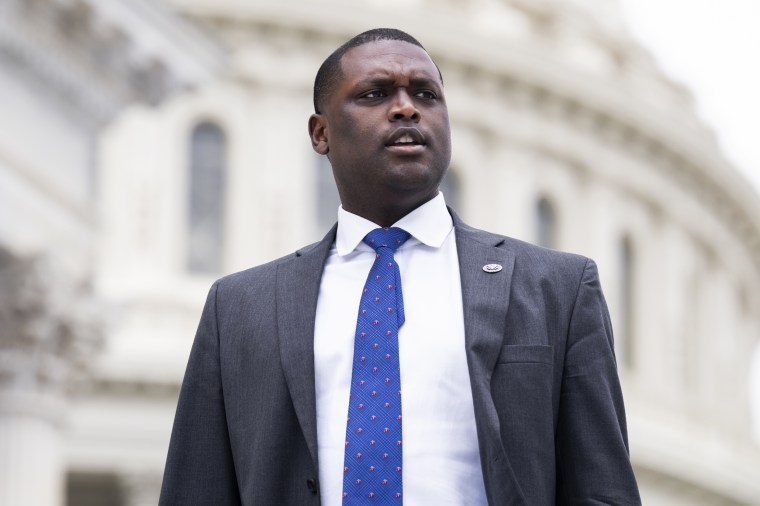KINGSTON, N.Y. — Huddled with volunteers at his campaign headquarters here, Iraq War veteran and freshman Rep. Pat Ryan said it felt like a “pre-mission brief” back in his Army days.
Ryan’s mission now is holding on to his seat in a suburban district in upstate New York that Republicans would very much like to flip — and that his Democratic Party needs if it has any hope of taking back control of the House.
The race underscores a unique dynamic in this year’s battle for the House: It hinges on areas in states well outside the presidential battleground map, most notably New York and California. New York also played a starring role two years ago. While an expected “red wave” didn’t materialize nationwide, the GOP won enough seats in this historically blue state to secure a slim House majority.
Back then, Ryan was a bright spot for beleaguered Democrats, who lost five competitive races in the midterms. Ryan ran and won twice that year — first in a special election, then for a full term — with a message focused on reproductive rights. It’s a focus he believes will resonate with voters again now, as he prepares for another close race.
“I can’t tell you the number of times I’ve been asked, like, ‘Do people care about this issue?’” Ryan told NBC News in an interview. “I’m like, it’s literally an existential, personal issue of freedom. And if you want to piss off the American people? Take their freedom away.”
Among the doubters about the issue’s salience is his opponent, Republican Alison Esposito. A former New York Police Department officer for decades, she was the GOP’s nominee for lieutenant governor in 2022, running alongside conservative former Rep. Lee Zeldin, who was the party’s gubernatorial candidate. The bid failed, but she credits their work then for why Republicans have been able to make some inroads in the state.
“We reached out to all New Yorkers,” Esposito told NBC News between knocking doors in Poughkeepsie. “It wasn’t just Republicans. I keep saying it’s not going to be, and this one either, not a red wave. This is a red, white and blue wave. This is a common-sense wave. This is Republicans, independents and Democrats alike, standing up and saying, enough.”
To Esposito, the election will be decided on hot-button issues the GOP regularly highlights: “It’s crime, public safety, law and order, the economy, the border crisis, the attack on our kids’ education,” she said. “As far as abortion, my opponent wants to make, wants to make this entire election about abortion, and it’s, it’s not even a factor in this race.”

Moments later, she knocked on the door of an older man who had a pro-Esposito sign in his yard. When Esposito asked him the issue he’d “like to see fixed first,” he replied quickly that he would like to see a “timeline on abortion,” suggesting legislation that would stop the practice at around the four-month mark.
Esposito told NBC News she believed the issue of abortion was best left to the states and that “it’s already settled in New York,” where abortions are legal up to 24 weeks and permitted after that point if the mother or fetus’ life is deemed in danger by a medical provider. But at the federal level, the issue is a live ball after the Supreme Court’s ruling that struck down Roe v. Wade, a decision Esposito previously praised as “the absolute right thing.”
The debate over reproductive rights has also come to include closer scrutiny of in vitro fertilization, which Esposito supports. The debate intensified earlier this year when an Alabama judge ruled that unused embryos should be given the same protections as children.
Asked what should happen to unused embryos, Esposito didn’t provide a clear answer as she sought to square her “pro-life” stance with giving women who want to have children options.
“I don’t know,” she said. “I believe in my heart that … life begins at conception. I do believe that, but I also understand that this is a nuanced argument, and I don’t think I’m going to stand here and say that, you know, I would do everything I can to protect those embryos, while I have women that are struggling to — you know? I would love to protect every one of them I can within the realm of the law. I just want to approach this as common sense and as empathetic as possible, you know, while protecting all the life I can.”
The battle for the suburbs
The battle for the 18th District is one of seven seats in New York that could determine the balance of power in Congress.
These toss-up races are subject to local, national and statewide crosswinds that are outside the candidates’ control, from a controversial New Yorker at the presidential level in Donald Trump to a Democratic governor with abysmal job approval ratings in Kathy Hochul to a recently-indicted New York City mayor in Eric Adams.
New York Democrats have privately shared concerns about the issues of Albany and New York City bleeding into other parts of the state where the party needs to win. But the top House Democrat, Rep. Hakeem Jeffries of New York, who would be speaker if Democrats grab control, downplayed the issue.
“We have incredible candidates who are running all across the state of New York and beyond, who are running their own races,” Jeffries said in an interview recently, while advocating that Adams should not resign as mayor. “They have their own track record of success and vision for the future in terms of delivering for the people that they hope to represent.”
Key local issues, like cleaning up the Hudson River, housing and the cost of living, are combined with national flashpoints on reproductive rights, immigration and protecting democracy.
It’s in that environment that freshman GOP Rep. Mike Lawler is campaigning to keep his seat in the suburban 17th District. His message is one of practicality and common sense, akin to Ryan’s pitch on the other side of the aisle.

“I am who I am, which is to say that I have always been bipartisan,” Lawler said outside a campaign stop to a VFW breakfast in Brewster. “I have always been independent-minded. I will fight for the things that matter to my district, first and foremost, like lifting the cap on SALT, like reducing the affordability crisis that we’re dealing with across this country, securing our borders.”
Not all those things are in line with the Republican at the top of the ticket. Lawler has worked to keep Trump at arm’s length during his campaign.
“When I agree with [Trump], I’ll say it. When I disagree with him, I’ll say it too. And I’ve never been shy about that,” Lawler said. “There’s a reason both Joe Biden and Donald Trump have praised me. It’s because I am willing to work across the aisle. I am willing to stand up for what I believe is right and get things done.”
Pressed on if House Republicans deserve to remain in the majority given the chaos of the last two years — which included ousting their own speaker less than a year into his tenure — Lawler provided an unequivocal “yes.”
“Yes, we’ve had some infighting, and at times it’s been a little chaotic. But the reality is, from a substantive policy standpoint, we’ve actually been the ones that have been fighting to address the challenges facing this country,” Lawler said. “Voters recognize that this is a choice on policy and substance, and so yes, I do deserve another term.”
Former Rep. Mondaire Jones, Lawler’s Democratic opponent, disagrees.
“He is part of a majority and a Republican Party that is responsible for the overturning of Roe v. Wade, and the only way we restore the protections that were taken away from women is to elect a Democratic Congress that will pass something called the Women’s Health Protection Act,” Jones said while campaigning at a rally for the Haitian community in his hometown of Spring Valley, New York.

That’s just one item on Jones’ list of unfinished congressional business. Citing past work on the bipartisan Inflation Reduction Act, which helped to cap insulin costs for people on Medicare, and a “pro-choice, pro-democracy” platform, Jones is seeking to chart a path back to his old seat. His absence on the ballot in 2022 — due to Democratic infighting after New York lost one congressional seat due to redistricting — is one reason he thinks Republicans like Lawler were able to succeed last time.
“It’s different this time around because I’m going to be on the ballot,” he said.
Aiming for the middle
These two races alone have seen more than $42 million worth of ads flood the airwaves. Both incumbents are tryin to focus on the political middle as their challengers provide vocal backup to the GOP and Democratic standard-bearers, respectively.
Ryan pitched bipartisan policy wins — citing work he’s done with Lawler, and even Trump-allied Rep. Elise Stefanik, while also campaigning alongside progressive Rep. Alexandria Ocasio-Cortez.
“I’m trying to get s— done,” Ryan said bluntly when asked about the political range in that list of names. “Like, seriously.”
Asked which Democrats in the New York delegation she could work with if she wins, Esposito could not offer any names. She pointed out that future work would be “based on policy” but that “some of the New York City Democrats” are “far left” and “it’s hard to find common ground with somebody like AOC” because of her stances on policing and Israel.
Ultimately, the partisan noise is impossible to tune out, for candidates and voters alike.
“Just trying to watch the Yankees and Mets and you’re getting everything thrown at you,” Ryan said, shrugging at the New York political climate. Reminded of the beleaguered New York Giants, he shook his head.
“Yeah, it’s tough right now as a Giants fan,” Ryan allowed, before pivoting back to his race. “But I think consistently, what folks get wrong is they don’t give people, and the American people and voters, enough credit.”

